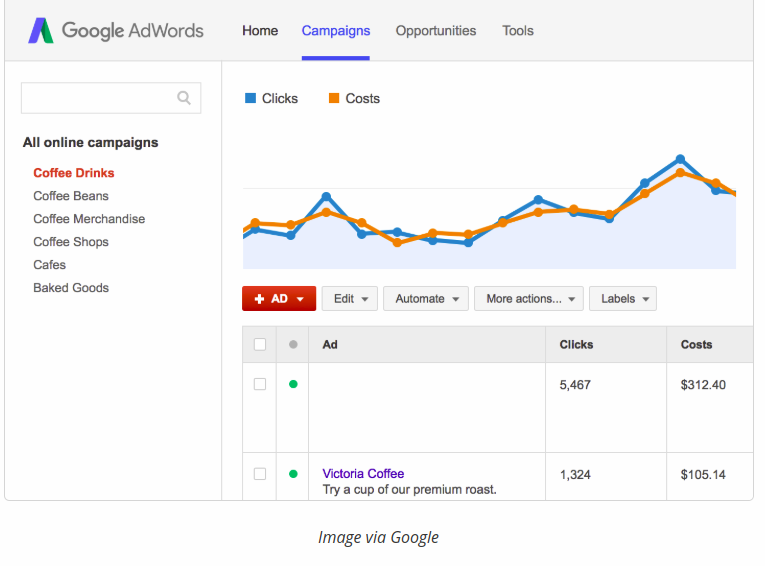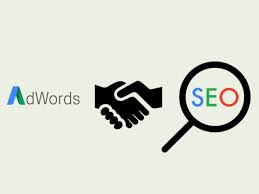Maybe you’ve just set up your first AdWords campaign, or maybe you are looking to jump into the world of PPC (pay-per-click). When I first started moseying around Google’s AdWords I had so many questions. The biggest question that left me scratching my head is wondering how bidding actually works in AdWords campaigns.
Our recent post, “Building an AdWords Campaign,” outlined considerations and steps that you should make before you you begin your campaign, but I didn’t dig into how PPC bidding actually works in Google.
First, the Google Search
The first step to any bidding is having an audience that is actually interested in your products and/or services. Let’s say “Sally” goes to Google and types in a query about shoes. She might type in, “cute fashion heels.” If you have an AdWords campaign for your business, and you are in the shoe industry, it’s possible that you have keywords in your campaign, like “heels” and “fashion.” Now, if you have a PPC campaign set up, you are competing against those other businesses who are selling shoes and have PPC campaigns through Google, using those keywords.
When Sally types in that query, Google looks at AdWords advertisers and considers whether there will be bidding. Based on the If you have set your campaign up for this type of bidding, you may be entering into an auction for those keywords used.

Google Auction in AdWords
Unlike those backwoods auctions with that your mom and dad love going to so they can bring home old books and furniture, a Google auction is as modern as it gets.
When you were building your AdWords campaign, there was an option to highlight certain keywords that you found to be relevant to your specific products/services. I like to group those keywords together based on the ads and set a limit as to how much I am willing to spend on a particular keyword.
When Sally enters her Google query, it all happens pretty fast. Google will look at your keywords and consider if they are relevant to her shoe search. Then Google will grab your keyword that is most relevant to Sally’s search, with the maximum bid amount that you were willing to spend on that particular keyword. Now, your keyword, let’s say it’s “heels,” is bidding against other relevant keywords, from other AdWord users. If you set your highest bid to $5.00 for that keyword in a bidding war, and your competition set his/her highest bid for “heels” to $4.50, you are more likely to win the bid.
BUT Google looks at more than just the bid that you are willing to make.
CPC and Quality Score
Have you ever seen a paid ad that you thought was kind of ugly? It’s likely that the fortunate marketer paid A LOT of money for that ad to appear. Why? Well, Google considers the visual components of your ad as well as the maximum bid that you are willing to spend on your ad when determining your ad rank.

The quality score that Google gives to your ad is based on how relevant your ad is to the consumer who typed in the search query. Google also looks at CTR (click-through-rate) and your landing page. YEP! I said landing page. Nobody likes going to a wonky and ugly landing page. Google considers the complete consumer experience. It’s not enough to put together a sort of decent ad, you also need to make sure that your landing page makes sense for your ad. For example, if you are selling shoes, you landing page should have written content that talks about shoes, uses some keywords, and is aesthetically pleasing.
Need landing page help? Our website designers build beautiful landing pages or clients everyday.
Let’s say you are willing to bid $10 on a keyword, but you have weak CTR and a terrible landing page, even if you have the highest bid by far, you are going to have a tougher time getting a higher ad rank. Your rank is dependent on both of these factors.
How Google Determines What You Pay
It comes down to the dollar amount. Stay with me, I’m going to explain how Google determines what you are going pay, CPC (cost-per-click), when you are bidding against other AdWords users.
Let’s pretend you are willing to spend up to $5 on a keyword, and Billy is willing to spend $1 on a keyword. Now, Google had a chance to look at your ad, landing page, and other elements that determine your quality score. Google has given you a quality score of 6 out of 10. Billy has, on the other hand, a ridiculously beautiful landing page and an optimized ad, so Google has given him a quality score of a 9 out of 10. If Billy ranks below you, at the seventh position. Then we can do some math to figure out how much you will pay per click.
Your price is equal to the ad rank of the person below you, divided by your quality score, plus $0.01.
You price (CPC) = 7/6 + $0.01, or $1.18.
Something to remember is that you can actually pay less for a higher position if you have a kick butt quality score.
It gets a little complicated, but once you sit down and consider what Google deems to be important, you can optimize your AdWords campaign and reach even more shoe lovers.
At HammockWeb, we know the ins-and-outs of AdWords. If you’re looking to work with a dedicated team of digital marketing gurus, we’re here for you! Contact us TODAY.
 +1 800-906-1504
+1 800-906-1504





